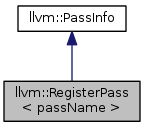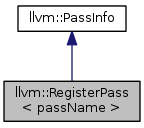LLVM API Documentation
#include <PassSupport.h>


Public Member Functions | |
| RegisterPass (const char *PassArg, const char *Name, bool CFGOnly=false, bool is_analysis=false) | |
 Public Member Functions inherited from llvm::PassInfo Public Member Functions inherited from llvm::PassInfo | |
| PassInfo (const char *name, const char *arg, const void *pi, NormalCtor_t normal, bool isCFGOnly, bool is_analysis) | |
| PassInfo (const char *name, const void *pi) | |
| const char * | getPassName () const |
| const char * | getPassArgument () const |
| const void * | getTypeInfo () const |
| bool | isPassID (const void *IDPtr) const |
| Return true if this PassID implements the specified ID pointer. More... | |
| bool | isAnalysisGroup () const |
| bool | isAnalysis () const |
| bool | isCFGOnlyPass () const |
| NormalCtor_t | getNormalCtor () const |
| void | setNormalCtor (NormalCtor_t Ctor) |
| Pass * | createPass () const |
| createPass() - Use this method to create an instance of this pass. More... | |
| void | addInterfaceImplemented (const PassInfo *ItfPI) |
| const std::vector< const PassInfo * > & | getInterfacesImplemented () const |
Additional Inherited Members | |
 Public Types inherited from llvm::PassInfo Public Types inherited from llvm::PassInfo | |
| typedef Pass *(* | NormalCtor_t )() |
RegisterPass<t> template - This template class is used to notify the system that a Pass is available for use, and registers it into the internal database maintained by the PassManager. Unless this template is used, opt, for example will not be able to see the pass and attempts to create the pass will fail. This template is used in the follow manner (at global scope, in your .cpp file):
static RegisterPass<YourPassClassName> tmp("passopt", "My Pass Name");
This statement will cause your pass to be created by calling the default constructor exposed by the pass. If you have a different constructor that must be called, create a global constructor function (which takes the arguments you need and returns a Pass*) and register your pass like this:
static RegisterPass<PassClassName> tmp("passopt", "My Name");
Definition at line 203 of file PassSupport.h.
|
inline |
Definition at line 206 of file PassSupport.h.
References llvm::PassRegistry::getPassRegistry(), and llvm::PassRegistry::registerPass().